11 Best Herbal Teas For Gout
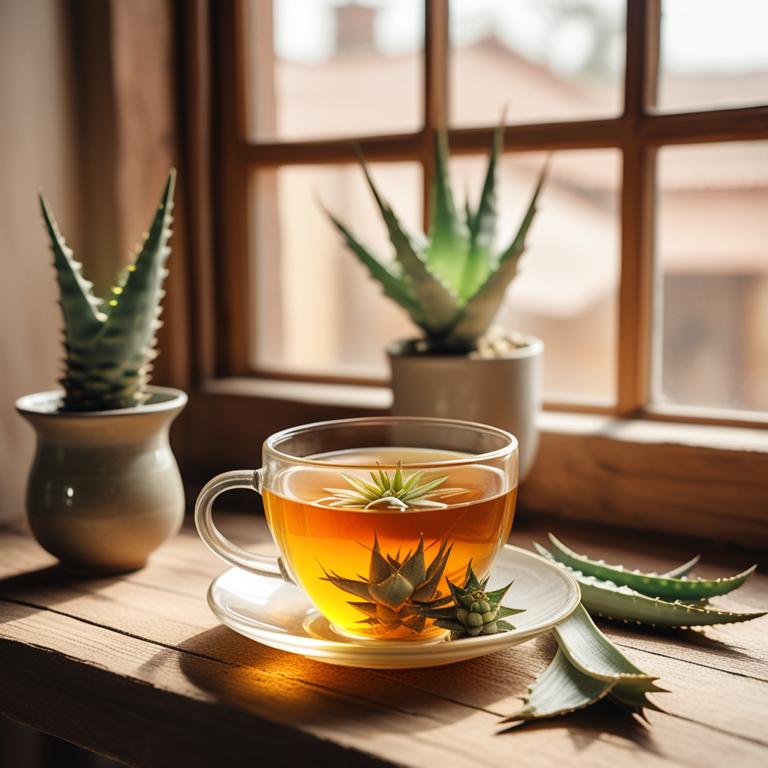
Herbal teas for Gout are natural remedies made from plants and herbs that help alleviate the symptoms and prevent the occurrence of gout attacks.
These teas work by reducing inflammation, lowering uric acid levels, and improving kidney function, thus providing relief from the excruciating pain and discomfort associated with gout.
Some popular herbal teas for gout include dandelion root tea, which helps flush out toxins and excess uric acid from the body, burdock root tea, which reduces inflammation and pain, and ginger tea, which has anti-inflammatory properties and improves digestion.
Other herbal teas, such as celery seed tea, turmeric tea, and juniper berry tea, also provide relief from gout symptoms by reducing inflammation, improving kidney function, and lowering uric acid levels.
Related Study
According to the study, teas for gout may be a safe and effective alternative for treating pain and symptoms of acute gouty arthritis due to the significantly better treatment effects in herbal medicine groups compared to western medicine control groups.
Below there's a list of the 11 best herbal teas for gout.
Table of Contents
Also, you may be interested in...
Today Free Bonus!
The Ultimate Herb Drying Checklist
(For Long-Lasting Powerful Medicinal Effect)
How to easily dry herbs that don't mold and that keep their strong medicinal power for more than 1 year.
1. Glycyrrhiza glabra teas

Glycyrrhiza glabra teas, derived from the licorice root, have been traditionally used to treat the gout ailment due to their anti-inflammatory and antioxidant properties.
These herbal preparations help to treat gout by reducing inflammation and pain, and also by modulating the body's immune response to prevent the formation of uric acid crystals.
The bioactive constituents responsible for these benefits include glycyrrhizin, which acts as a potent anti-inflammatory agent, and flavonoids, such as licochalcone, which exhibit antioxidant and anti-inflammatory activities.
The benefits of using Glycyrrhiza glabra teas to treat gout include reduced pain and inflammation, improved joint mobility, and a lower risk of kidney stones and other complications associated with gout.
Recipe:
- Gather 1 cup of fresh or dried Glycyrrhiza glabra roots and 1 cup of water.
- Rinse the roots and chop them into small pieces.
- Boil the water and add the chopped roots to it.
- Reduce heat and let it simmer for 5-7 minutes. Strain the mixture and discard the roots.
- Drink 1 cup of the tea, 2-3 times a day, to help manage gout symptoms.
Glycyrrhiza glabra teas can be used to treat gout, but its long-term use may lead to potential side effects such as high blood pressure, potassium deficiency, and an increased risk of heart problems due to its effect on the body's electrolyte balance.
To safely use these teas for gout treatment, it is recommended to drink them in moderation and for short periods, monitor blood pressure regularly, and maintain a balanced diet rich in potassium-rich foods to minimize the risk of adverse effects.
Glycyrrhiza Glabra Tea on Amazon
Pukka Herbal Teas Licorice and Cinnamon - 20 Bags, 20 Count
Disclaimer: We earn a commission if you click this link and make a purchase at no additional cost to you.
2. Curcuma longa teas

Curcuma longa teas, derived from the Curcuma longa plant, have been traditionally used to treat gout due to their anti-inflammatory and antioxidant properties.
The bioactive constituents present in Curcuma longa, including curcumin, demethoxycurcumin, and bisdemethoxycurcumin, help to reduce inflammation and alleviate symptoms associated with gout.
By inhibiting the production of pro-inflammatory enzymes and cytokines, these teas can help to reduce the severity and frequency of gout attacks.
The benefits of using Curcuma longa teas to treat gout include reduced joint pain and swelling, improved mobility, and a lower risk of developing kidney stones associated with gout.
Recipe:
- Gather 1 cup of water and 2 tablespoons of dried Curcuma longa root.
- Heat the water in a pot and bring it to a boil.
- Reduce heat and add the Curcuma longa root to the water.
- Steep the mixture for 5-7 minutes, then strain it into a cup.
- Drink 1 cup of the Curcuma longa tea, 2-3 times a day, as needed to help manage gout symptoms.
Curcuma longa teas can be an effective herbal remedy for treating gout, but potential side effects include stomach upset, diarrhea, and allergic reactions in some individuals.
When using Curcuma longa teas to treat gout, take precautions such as starting with low doses, monitoring blood sugar levels if you have diabetes, and avoiding consumption with blood thinners or other medications that may interact with its active compounds.
Curcuma Longa Tea on Amazon
Pure Ceylon Turmeric Brew - 100% Organic Ceylon Turmeric Tea Bags (40 Sachets - pack of 2 – 20 COUNT PER BOX)
Disclaimer: We earn a commission if you click this link and make a purchase at no additional cost to you.
3. Cinchona officinalis teas

Cinchona officinalis teas have been used traditionally to treat gout, a painful inflammatory condition caused by uric acid buildup in the joints.
The anti-inflammatory properties of this herbal preparation, particularly its ability to inhibit the production of pro-inflammatory cytokines, help to reduce swelling and alleviate pain associated with gout.
The bioactive constituents of Cinchona officinalis, including quinine and other alkaloids, help to lower uric acid levels and reduce inflammation in the joints.
The benefits of using Cinchona officinalis teas to treat gout include reduced symptoms, improved joint mobility, and a decrease in the frequency and severity of gout attacks.
Recipe:
- Gather 2 teaspoons of dried Cinchona officinalis bark.
- Boil 1 cup of water in a pot.
- Add the dried Cinchona bark to the boiling water.
- Reduce heat and let it simmer for 5-7 minutes.
- Strain the tea and drink 1/2 cup, 2-3 times a day, as needed.
Cinchona officinalis teas can be used to treat gout, but it may cause side effects such as nausea, dizziness, and stomach upset in some individuals.
To use Cinchona officinalis teas safely, it is recommended to start with a low dose and gradually increase it, as well as to avoid consuming it with other stimulants like caffeine or other medications that may interact with its active compounds, quinine and quinidine.
Cinchona Officinalis Tea on Amazon
Quina Roja(chinona) & Palo de Víbora Tea – 100% Natural, Vegan, Hecho en México | 25 Tea Bags
Disclaimer: We earn a commission if you click this link and make a purchase at no additional cost to you.
4. Achillea millefolium teas

Achillea millefolium teas, also known as yarrow tea, have been traditionally used to treat gout due to their anti-inflammatory and diuretic properties.
The herbal preparation helps to treat gout by reducing inflammation and relieving pain in the joints, while also promoting the removal of excess uric acid from the body.
The bioactive constituents of yarrow tea, including flavonoids and terpenoids, contribute to its medicinal effects by inhibiting the production of pro-inflammatory enzymes and improving uric acid excretion.
Regular consumption of yarrow tea has been shown to provide relief from gout symptoms, making it a beneficial natural remedy for managing the condition.
Recipe:
- Gather 2 tablespoons of dried Achillea millefolium leaves and flowers.
- Pour 1 cup of boiling water over the leaves and flowers.
- Steep for 5-7 minutes, then strain the mixture into a cup.
- Add honey to taste, if desired, and mix well.
- Drink the tea 2-3 times a day, as needed, to help manage gout symptoms.
Achillea millefolium teas can be used to help alleviate symptoms of gout, but possible side effects may include stomach upset, nausea, and allergic reactions such as skin rash or itching.
When using Achillea millefolium teas to treat gout, precautions should be taken to avoid overconsumption, as it may interact with other medications, and to monitor for signs of liver damage, such as yellowing of the skin or eyes, and to avoid using it if you have a history of bleeding disorders.
Achillea Millefolium Tea on Amazon
Biokoma Pure and Organic Yarrow Dried Herb 30 Tea Bags 1.5oz In Resealable Moisture Proof Pouch, USDA Certified Organic - Herbal Tea, No Additives, No Preservatives, No GMO, Kosher
Disclaimer: We earn a commission if you click this link and make a purchase at no additional cost to you.
5. Urtica dioica teas

Urtica dioica teas, also known as stinging nettle tea, have been traditionally used to treat gout, a painful condition caused by the buildup of uric acid in the joints.
The anti-inflammatory and diuretic properties of this herbal preparation help to reduce the inflammation and swelling associated with gout, while also promoting the removal of excess uric acid from the body.
The bioactive constituents of Urtica dioica, including flavonoids, alkaloids, and saponins, work together to inhibit the production of uric acid and reduce its levels in the blood, providing relief from gout symptoms.
The benefits of using Urtica dioica teas to treat gout include reduced pain and inflammation, improved joint mobility, and a decrease in the frequency and severity of gout attacks.
Recipe:
- Gather 2 cups of fresh Urtica dioica leaves and flowers, or 1 tablespoon of dried leaves.
- Use a tea infuser or a heat-resistant cup to steep the Urtica dioica in 1 cup of boiling water for 5-7 minutes.
- Strain the liquid and discard the solids. Add honey or lemon to taste, if desired.
- Drink 1 cup of Urtica dioica tea, 2-3 times a day. Consult a doctor before using it as treatment for gout.
- Store any leftover tea in the refrigerator and use it within 24 hours.
Urtica dioica teas can be an effective herbal remedy for treating gout, but it may cause side effects such as allergic reactions, digestive issues, and increased urination due to its diuretic properties.
To use Urtica dioica teas safely, it is essential to monitor your body's response and discontinue use if you experience any adverse reactions, and also to start with low doses and gradually increase as needed, as excessive consumption may exacerbate gout symptoms or interact with other medications.
Urtica Dioica Tea on Amazon
The Republic of Tea — Organic Nettle SuperHerb Tea Tin, 36 Herbal Tea Bags, Naturally Caffeine-Free
Disclaimer: We earn a commission if you click this link and make a purchase at no additional cost to you.
6. Berberis vulgaris teas
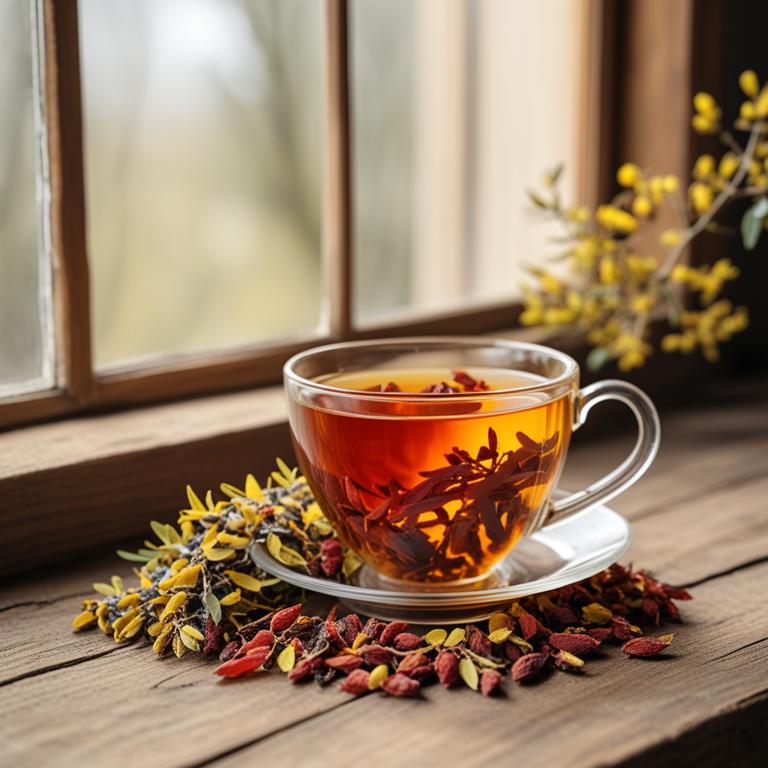
Berberis vulgaris teas have been traditionally used to treat gout due to their anti-inflammatory, antioxidant, and uricosuric properties.
The bioactive constituents, including berberine, isoquinoline alkaloids, and flavonoids, help to reduce uric acid levels in the blood, alleviate pain and inflammation, and promote kidney function, thereby facilitating the treatment of gout.
By inhibiting the enzyme xanthine oxidase, which contributes to uric acid production, Berberis vulgaris teas can help to mitigate the severity of gout attacks.
The benefits of this herbal preparation include reduced pain, swelling, and inflammation, as well as improved kidney function and overall well-being in individuals suffering from gout.
Related Study
According to "Molecules (Basel, Switzerland)", Berberis vulgaris teas for gout may be beneficial due to the high ferric reducing antioxidant power (FRAP) and 1,1-diphenyl-2-picrylhydrazyl radical (DPPH) values found in extracts of wild B. vulgaris L.
Recipe:
- Gather 1 cup of fresh Berberis vulgaris roots and 2 cups of water.
- Wash the roots with clean water, then chop them into small pieces.
- Combine the chopped roots with 2 cups of water in a saucepan and bring to a boil.
- Reduce heat and let it simmer for 10-15 minutes. Strain the mixture using a cheesecloth or a fine-mesh sieve.
- Drink 1/2 cup of the tea 2-3 times a day to help manage gout symptoms.
Berberis vulgaris teas can be used as a potential treatment for gout, but its use may cause side effects such as gastrointestinal disturbances, allergic reactions, and increased bleeding risk due to its anticoagulant properties.
To use Berberis vulgaris teas safely, precautions should be taken to avoid excessive consumption, as it may interact with blood-thinning medications and worsen kidney function in individuals with pre-existing kidney problems, and to monitor urine output and kidney function regularly.
7. Arctium lappa teas
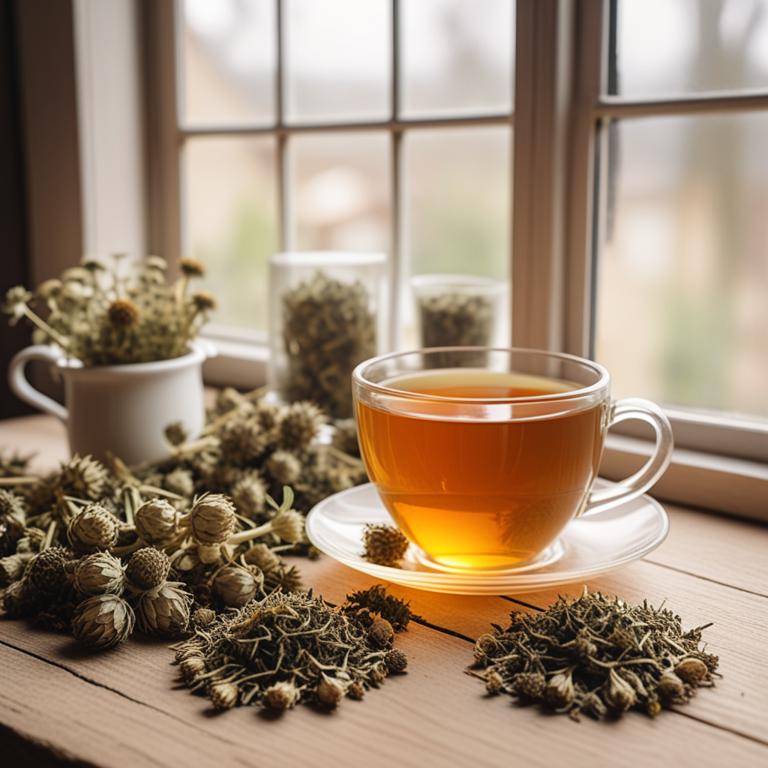
Arctium lappa teas have been traditionally used to treat gout, a painful condition characterized by inflammation and swelling in the joints, due to its anti-inflammatory and diuretic properties.
The herbal preparation helps to reduce the severity of gout symptoms by inhibiting the production of pro-inflammatory cytokines and promoting the excretion of uric acid, a key contributor to gout.
The bioactive constituents, including arctiin, arctigenin, and lupulin, exhibit potent anti-inflammatory and antioxidant activities, which help to alleviate pain, reduce swelling, and prevent further damage to the joints.
Regular consumption of Arctium lappa teas has been shown to provide relief from gout symptoms, improve joint health, and reduce the risk of future gout attacks.
Recipe:
- Gather 2 tablespoons of dried Arctium lappa roots, 1 cup of water, and a tea infuser.
- Boil the water in a pot and remove from heat.
- Add the dried Arctium lappa roots to the tea infuser and steep in the hot water for 5-7 minutes.
- Strain the tea into a cup and discard the roots.
- Drink the tea 2-3 times a day for relief from gout symptoms, but consult a doctor before using as treatment.
Arctium lappa teas can potentially treat gout symptoms; however, possible side effects include gastrointestinal issues such as nausea, diarrhea, and stomach cramps due to its saponin content.
To use Arctium lappa teas safely, it is recommended to start with low doses and gradually increase as needed, and also to be aware of potential allergic reactions, particularly skin irritation or respiratory problems, and to discontinue use if these symptoms occur.
8. Rheum officinale teas
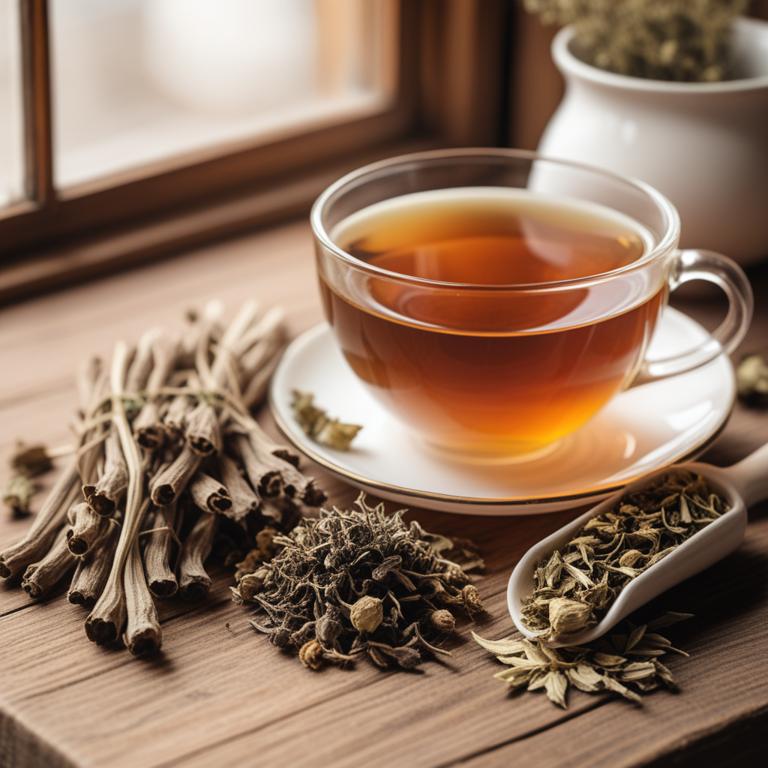
Rheum officinale teas have been traditionally used to treat gout, a painful condition characterized by inflammation and joint pain.
The anti-inflammatory and analgesic properties of this herbal preparation help to reduce swelling and alleviate pain associated with gout.
The bioactive constituents, including rhein, emodin, and anthraquinones, present in Rheum officinale teas, contribute to their therapeutic effects by inhibiting the production of pro-inflammatory cytokines and reducing uric acid levels in the blood.
The benefits of using Rheum officinale teas to treat gout include reduced pain and inflammation, improved joint function, and a decrease in the frequency and severity of gout attacks.
Recipe:
- Gather 1 tablespoon of dried Rheum officinale root and 1 cup of boiling water.
- Steep the root in the boiling water for 5-7 minutes. Strain the liquid using a fine-mesh sieve or cheesecloth.
- Combine the strained liquid with 1 cup of cold water. Let it cool down.
- Add honey or lemon to taste, if desired. Stir well.
- Drink 1/2 to 1 cup of the tea 2-3 times a day to help manage gout symptoms.
Rheum officinale teas can be beneficial in treating gout, but its use may also lead to side effects such as stomach upset, diarrhea, and nausea due to its emetic properties, which can cause vomiting in some individuals.
To use Rheum officinale teas safely, it is recommended to start with a low dose and gradually increase it, as prolonged use can lead to kidney damage and electrolyte imbalance if not properly managed.
9. Rheum palmatum teas
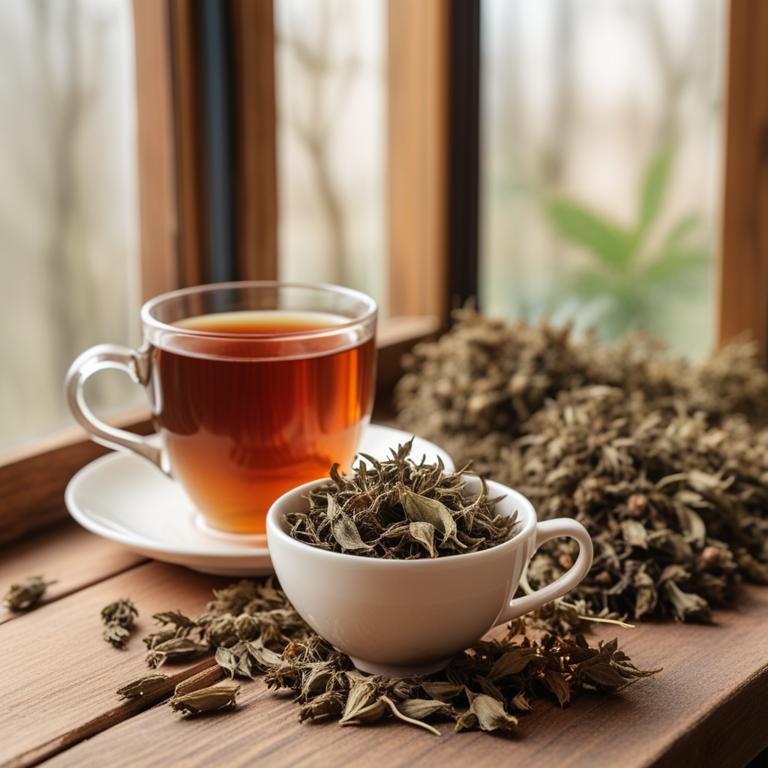
Rheum palmatum teas have been used in traditional Chinese medicine for centuries to treat gout, a painful condition caused by excess uric acid in the body.
The anti-inflammatory and diuretic properties of Rheum palmatum teas help to reduce swelling and relieve pain in the joints, making it an effective herbal remedy for gout.
The bioactive constituents of Rheum palmatum teas, including anthraquinones and saponins, work together to reduce uric acid levels, inhibit the formation of uric acid crystals, and improve kidney function, all of which contribute to the treatment of gout.
By regularly consuming Rheum palmatum teas, individuals with gout can experience relief from symptoms, improved joint mobility, and a reduction in the frequency and severity of gout attacks.
Recipe:
- Gather 1 cup of fresh or dried Rheum palmatum roots. You can find them in health food stores or online.
- Wash the roots with water and chop them into small pieces.
- Measure 1 tablespoon of chopped roots and put them in a pot.
- Add 1 cup of boiling water to the pot and let it steep for 10-15 minutes.
- Strain the tea and drink 1/2 cup, 2-3 times a day to help with gout symptoms.
Rheum palmatum teas can help alleviate gout symptoms, but possible side effects may include stomach upset, diarrhea, and allergic reactions such as skin rashes or itching.
To use Rheum palmatum teas safely, take precautions by starting with small doses, monitoring your body's response, and avoiding use if you experience severe stomach discomfort or other adverse reactions.
10. Lavandula angustifolia teas

Lavandula angustifolia teas, also known as English lavender tea, have been traditionally used to treat gout due to their anti-inflammatory and antioxidant properties.
The bioactive constituents of this herbal preparation, such as linalool, linalyl acetate, and camphor, help to reduce inflammation and alleviate pain associated with gout.
Lavandula angustifolia teas also possess diuretic properties, which can help to flush out uric acid crystals from the body, thereby reducing the severity of gout symptoms.
The benefits of using Lavandula angustifolia teas to treat gout include reduced inflammation, pain relief, and improved uric acid excretion, making it a promising natural remedy for managing this condition.
Recipe:
- Gather 1 tablespoon of dried Lavandula angustifolia flowers.
- Boil 1 cup of water in a pot.
- Pour the boiling water over the Lavandula angustifolia flowers in a cup.
- Let it steep for 5-7 minutes, then strain the flowers.
- Drink 1/2 cup of the tea, 2-3 times a day, after consulting a doctor for gout treatment.
Lavandula angustifolia teas can be used as a potential treatment for gout due to its anti-inflammatory properties, but it may cause side effects such as stomach upset, digestive issues, and allergic reactions in some individuals.
When using Lavandula angustifolia teas to treat gout, it is essential to take precautions, including starting with small doses, monitoring blood sugar levels, and being cautious of interactions with other medications, especially those for diabetes, as the tea may lower blood sugar levels.
Lavandula Angustifolia Tea on Amazon
Tiesta Tea - Lavender Chamomile Herbal Tea | Loose Leaf | Calming Blend with Chamomile and Lavender | Caffeine-Free Herbal | Great for Hot or Iced Brews | Resealable Bulk Pouch, 200 Cups | 8 Ounce
Disclaimer: We earn a commission if you click this link and make a purchase at no additional cost to you.
11. Taraxacum officinale teas

Taraxacum officinale teas, derived from the dandelion plant, have been traditionally used to treat gout due to their anti-inflammatory and diuretic properties.
These properties help to reduce swelling and inflammation in the joints, while the diuretic effect aids in the removal of excess uric acid from the body, which is often the cause of gout.
The bioactive constituents of Taraxacum officinale teas, including flavonoids, phenolic acids, and sesquiterpenes, contribute to their therapeutic effects, helping to alleviate symptoms and prevent future gout attacks.
Regular consumption of Taraxacum officinale teas may provide relief from gout symptoms, improve kidney function, and even lower uric acid levels, making it a potential natural remedy for managing this condition.
Recipe:
- Gather 1 cup of fresh Taraxacum officinale leaves and flowers. You can use 1/4 cup of dried leaves as a substitute.
- Pour 1 cup of boiling water over the leaves and flowers in a cup or teapot.
- Let it steep for 5-7 minutes, then strain the mixture into another cup.
- Add 1 tablespoon of honey to the tea, if desired, to make it sweeter.
- Drink the tea 2-3 times a day for relief from gout symptoms. Consult a doctor before using it for medical treatment.
Taraxacum officinale teas can be used to treat gout, but it may cause side effects such as stomach upset, diarrhea, and allergic reactions in some individuals.
When using Taraxacum officinale teas to treat gout, it's essential to start with small doses and gradually increase the amount, as excessive consumption may lead to liver or kidney problems.
Taraxacum Officinale Tea on Amazon
Teeccino Dandelion Coconut Tea - Caffeine Free, Roasted Herbal Tea with Prebiotics, 3x More Herbs than Regular Tea Bags, Gluten Free - 25 Tea Bags
Disclaimer: We earn a commission if you click this link and make a purchase at no additional cost to you.